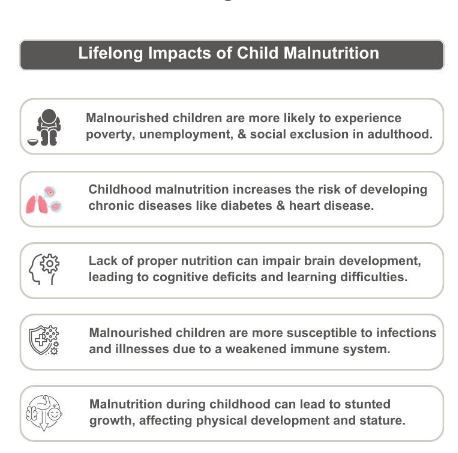Nourishing their Future: Understanding the Lifelong Impact of adequate Nutrition on Child Health
Proper nutrition plays a critical role in the overall health and well-being of children. During early life, nutrition has the most significant impact on their growth, development, and long-term health. By providing children with a balanced diet rich in essential nutrients, we can set the stage for a lifetime of good health. In this article, we will explore the connection between proper nutrition and lifelong health, understand the key nutrients required for optimal child health, and delve into the lifelong impacts of proper nutrition on child health.

The Importance of Early Nutrition
A. The Importance of Early Nutrition
Proper nutrition in the early years of life is crucial as it provides the necessary building blocks for growth and development. During this period, the brain, immune system, bones, and vital organs undergo significant development. A well-balanced diet during this time ensures that children receive the necessary nutrients they need to support these processes.
B. The Connection Between Proper Nutrition and Lifelong Health
Proper nutrition in the early years of life is crucial as it provides the necessary building blocks for growth and development. During this period, the brain, immune system, bones, and vital organs undergo significant development. A well-balanced diet during this time ensures that children receive the necessary nutrients they need to support these processes.
C. Setting the Stage for Lifelong Well-being
Proper nutrition early in life not only promotes physical growth but also sets the stage for lifelong well-being. It helps in establishing healthy eating habits, boosts cognitive development, and strengthens the immune system. By nourishing children with the right nutrients during their early years, we can empower them to lead healthy and fulfilling lives.
The Importance of Early Nutrition
A. Essential Vitamins for Growth and Development
1. Vitamin A: Supporting Healthy Vision and Immunity
Vitamin A is crucial for maintaining healthy vision and supporting the immune system. It promotes the proper functioning of the eyes and helps prevent night blindness. Additionally, Vitamin A plays a vital role in enhancing immunity, protecting children from various infections and diseases.
2. Vitamin D: Promoting Strong Bones and Overall Health
Vitamin D is essential for the absorption of calcium, which is critical for the development of strong and healthy bones. It also plays a role in promoting overall health by supporting the immune system and reducing the risk of chronic diseases.

3. Vitamin C: Boosting Immune Function and Wound Healing
Vitamin C is well-known for its immune-boosting properties. It helps protect against infections, aids in wound healing, and supports the body’s natural defense mechanisms. Adequate Vitamin C intake is essential for optimal child health and well-being.
B. Crucial Minerals for Cognitive and Physical Development
1. Iron: Fuelling Brain Function and Preventing Anemia
Iron is crucial for proper brain function, as it helps carry oxygen to the brain cells. It also plays a significant role in preventing iron deficiency anemia, a condition that can have long-term effects on cognitive function and physical development.
2. Calcium: Building Strong Bones and Teeth
Calcium is essential for the development of strong bones and teeth. It is particularly important during childhood when bones are growing rapidly. Adequate calcium intake ensures optimal bone health and reduces the risk of conditions like osteoporosis later in life.
3. Zinc: Supporting Growth, Immune System, and Wound Healing
Zinc plays a vital role in supporting growth and development, as well as boosting the immune system. It promotes the synthesis of proteins and DNA, aids in wound healing, and helps fight off infections. Adequate zinc intake is necessary for optimal child health.
C. Balancing Macronutrients for Energy and Growth
1. Iron: Fuelling Brain Function and Preventing Anemia
Carbohydrates are the body’s main source of energy. They provide fuel for daily activities, physical growth, and development. Choosing healthy carbohydrates, such as whole grains, fruits, and vegetables, can ensure a steady supply of energy for children.
2. Essential Proteins: Building Blocks for Growth and Repair
Proteins are essential for the growth and repair of body tissues. They provide the building blocks for muscles, organs, and cells. Including adequate protein sources, such as lean meats, poultry, fish, beans, and nuts, in a child’s diet supports optimal growth and development.
3. Healthy Fats: Supporting Brain Development and Nutrient Absorption
Healthy fats, such as omega-3 fatty acids, are crucial for brain development and function. They also play a role in nutrient absorption and hormone production. Including sources of healthy fats, like avocados, nuts, and olive oil, in a child’s diet promotes optimal cognitive function and overall health.
The Lifelong Impacts of Proper Nutrition on Child Health
A. Cognitive Development and Academic Achievement
1. Nutritional Influence on Brain Development and Function
Proper nutrition plays a vital role in brain development and function. Essential nutrients, such as vitamins, minerals, and healthy fats, provide the necessary support for optimal cognitive development. They help in the formation of neural connections, improve memory and concentration, and enhance learning abilities.
2. The Relationship between Proper Nutrition and Cognitive Abilities
Research has shown a strong association between proper nutrition and cognitive abilities in children. Adequate nutrient intake, especially during the early years, has been linked to improved intelligence, enhanced problem-solving skills, and better academic performance.
3. Boosting Academic Success through Nourishment
Proper nutrition sets the stage for academic success. By providing children with the necessary nutrients, parents and caregivers can optimize their cognitive abilities, improve memory and concentration, and enhance overall academic achievement.

B. Physical Growth and Development
1. Nutritional Influence on Brain Development and Function
Proper nutrition plays a vital role in brain development and function. Essential nutrients, such as vitamins, minerals, and healthy fats, provide the necessary support for optimal cognitive development. They help in the formation of neural connections, improve memory and concentration, and enhance learning abilities.
2. Preventing Stunting and Promoting Growth Milestones
Adequate nutrition is crucial in preventing stunting, a condition characterized by impaired growth and development. Malnutrition during the early years can have long-term effects on a child’s height, limiting their potential. Proper nutrition, on the other hand, ensures that children achieve important growth milestones.
3. Building Strong Immunity to Fight Diseases
Proper nutrition strengthens the immune system, equipping children with the tools to fight off infections and diseases. Essential nutrients, such as vitamins and minerals, support the development and functioning of the immune system, reducing the risk of illnesses and promoting overall health.
C. Mitigating the Risk of Chronic Diseases in Adulthood
1. Early Nutrition's Impact on Reducing Chronic Disease Risk
Proper nutrition during childhood has a significant impact on the risk of chronic diseases in adulthood. Research has shown that a diet rich in fruits, vegetables, whole grains, and lean proteins can reduce the risk of conditions like cardiovascular disease, diabetes, and certain types of cancer.
2. The Role of Childhood Nutrition in Preventing Obesity
Childhood nutrition plays a crucial role in preventing obesity, a condition associated with an increased risk of chronic diseases. A balanced diet, combined with regular physical activity, helps children maintain a healthy weight and reduces the likelihood of obesity-related health issues.
3. Establishing Lifelong Healthy Eating Habits
Early exposure to a variety of nutritious foods sets the stage for lifelong healthy eating habits. By introducing children to a wide range of fruits, vegetables, whole grains, and lean proteins, parents and caregivers can instill a love for nutritious foods and promote a balanced approach to eating.
Implementing Proper Nutrition for Child Health
A. The Role of Parents and Caregivers
1. Creating a Nourishing Environment at Home
Parents and caregivers play a crucial role in creating a nourishing environment at home. This includes providing healthy food choices, promoting regular family meals, and involving children in grocery shopping and meal preparation.
2. The Power of Positive Role Modeling
Positive role modeling is a powerful tool in encouraging healthy eating habits. By modeling healthy eating behaviors themselves, parents and caregivers can influence children to make nutritious choices and develop a positive relationship with food.
3. Practical Strategies for Encouraging Healthy Food Choices
Practical strategies, such as offering a variety of nutritious foods, involving children in meal planning, and making mealtimes enjoyable, can encourage healthy food choices. It is important to create a positive and supportive environment that promotes nutritious eating habits.
B. School-based Nutrition Programs and Their Significance
1. The Importance of Nutritional Education in Schools
Nutritional education in schools is essential in promoting proper nutrition and healthy eating habits. It helps children understand the importance of nutritious food choices, teaches them how to make informed decisions, and equips them with the knowledge to lead healthy lives.
2. School Lunch Programs and Their Impact on Child Health
School lunch programs play a significant role in ensuring children have access to nutritious meals. These programs aim to provide balanced meals that meet the nutritional needs of children, contributing to their overall health and well-being.
3. Collaborative Efforts for Ensuring Nutritious Environments
Collaborative efforts involving parents, caregivers, schools, and communities are crucial in creating and maintaining nutritious environments for children. By working together, we can ensure that children have access to healthy food options both at home and in schools.
C. Addressing Socioeconomic Factors and Disparities in Nutrition Access
1. The Importance of Nutritional Education in Schools
Nutritional education in schools is essential in promoting proper nutrition and healthy eating habits. It helps children understand the importance of nutritious food choices, teaches them how to make informed decisions, and equips them with the knowledge to lead healthy lives.
2. Community Initiatives Promoting Affordable and Healthy Food Options
Community initiatives that promote affordable and healthy food options can play a crucial role in improving nutrition access. Farmers’ markets, community gardens, and partnerships with local growers can help make nutritious foods more accessible and affordable for families.
3. Policy Interventions to Bridge the Nutrition Gap
Policy interventions at the local, regional, and national levels are necessary to bridge the nutrition gap and address disparities in access to nutritious food. These can include initiatives like food labeling regulations, school nutrition standards, and public health campaigns promoting healthy eating habits.
Conclusion
A. The Long-term Benefits of Proper Nutrition on Child Health
Proper nutrition in childhood has long-term benefits that extend into adulthood. By providing children with a well-balanced diet rich in essential nutrients, we can set them up for a lifetime of good health. From cognitive development to physical growth, proper nutrition lays the foundation for overall well-being.
B. Empowering Children for a Healthy Future
Proper nutrition empowers children to take control of their health and make informed decisions about their diet. By instilling healthy eating habits and providing access to nutritious foods, we can equip children with the tools they need to lead healthy and fulfilling lives.
C. The Lifelong Health Impacts of Child Malnutrition
Childhood is a critical period of growth and development, laying the foundation for lifelong health and well-being. Yet, for millions of children around the world, malnutrition casts a long shadow over their future prospects. In remote and marginalized communities, where resources are scarce and access to healthcare is limited, the impacts of child malnutrition are particularly devastating. Let’s delve into the lifelong health consequences of this pressing issue.
**Maternal & Child Mortality: A Grim Reality**
Malnutrition increases the risk of maternal and child mortality, robbing families of their loved ones and perpetuating cycles of grief and hardship. According to the World Health Organization (WHO), malnutrition contributes to nearly half of all deaths in children under the age of five globally, making it a leading cause of mortality in this vulnerable age group.
**Anemia: The Silent Threat**
Both maternal and child anemia are common consequences of malnutrition, with far-reaching implications for health. Anemia in pregnant women increases the risk of maternal mortality and complications during childbirth. For children, anemia can impair cognitive development, weaken immunity, and stunt growth, setting the stage for long-term health challenges.
**Loss of Immunity: A Vulnerable Future**
Malnutrition compromises the immune system, leaving children vulnerable to infections and diseases. This loss of immunity not only increases the likelihood of short-term illnesses but also has long-term implications for overall health. Children who experience recurrent infections during early childhood may face chronic health issues later in life, perpetuating a cycle of illness and vulnerability.
**Hindered Cognitive Development: A Barrier to Success**
Proper nutrition is essential for optimal brain development during childhood. However, malnutrition can hinder cognitive development, impairing learning abilities, and limiting educational attainment. Children who experience malnutrition in early life may struggle academically, earning lower incomes and facing greater barriers to economic and social mobility as adults.
**Stunting and Wasting: Physical Manifestations of Malnutrition**
Stunting and wasting are physical manifestations of malnutrition, reflecting chronic undernutrition and acute food shortages, respectively. These conditions not only impair physical growth but also increase the risk of long-term health problems, including impaired immune function, decreased cognitive abilities, and a heightened susceptibility to chronic diseases later in life.
**Psychological Trauma: Scars that Run Deep**
Malnutrition can also inflict psychological trauma, leaving lasting scars on children’s mental and emotional well-being. The experience of hunger and deprivation during critical developmental stages can lead to anxiety, depression, and other mental health disorders that persist into adulthood, impacting relationships, productivity, and overall quality of life.
In conclusion, the lifelong health impacts of child malnutrition are profound and far-reaching. From maternal and child mortality to impaired cognitive development, stunting, and psychological trauma, malnutrition leaves an indelible mark on individuals and communities. As we strive to build a healthier, more equitable world, addressing the root causes of child malnutrition must remain a top priority, particularly in remote and marginalized communities where the need is greatest. Together, let us work towards a future where every child has the opportunity to thrive, free from the shadow of malnutrition.
Taking Action Today for Lifelong Well-being
It is essential that we take action today to prioritize proper nutrition for children. Whether it’s through creating a nourishing home environment, supporting school-based nutrition programs, or addressing socioeconomic factors, every effort counts in ensuring the lifelong well-being of our children. By investing in their nutrition, we are nurturing their future.










